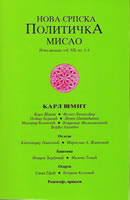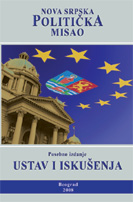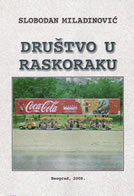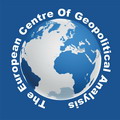| NSPM in English | |||
Albania — the geopolitical reactivation |
 |
 |
 |
| уторак, 22. јун 2010. | |
|
(June 2010)
For the first time in its history, Albania has a chance to create its own structure and future independently. Membership in NATO and a big chance to become a member of European Union in foreseeable future make many observers more and more confident that Tirana noticed its own ability to do it. Thus, we can notice a kind of a “restart” in the modern history of Albania in political, economic, social and consciousness aspect. Imperial legacy Albania is the only state in the region which has very faint traditions of existence as an independent state. The main factor responsible for this situation was the six century-lasting hegemony of Osman Empire in Balkans. Albanians were one of very few Balkan nations who perceived the supremacy of Porta as a chance for their own relatively normal existence. However the alliance with Turks did not end with the creation of an independent Albanian state, they enjoyed the widest privileges among the Balkan nations (those privileges were often connected with conversion to Islam). The fall of Porta and withdrawal of the Turks from Balkan Peninsula left Albanians on their own. It was logical that the other Balkan states perceived Albanians as a threat. This attitude resulted in their striving to weaken the already feeble Albanian state. The Conference of Ambassadors of the states of the region that took place in the years 1912-1913 has agreed on some very meaningful territorial divisions, which results are still being experienced by Albanians today. During the conference, the Albanian borders were fixed. Kosovo was not included as a part of the new Albanian territory (it came under the rule of the Kingdom of Serbs, Croatians and Slovenians), neither was the province of Ioanina(the former capital of southern Albania) that became a part of Greece[1]. The new territorial divisions made almost half of Albanian people turned up outside their country. Both the period of the World War I and the period between World Wars was the time of a deep Italian interference in Albania. This phenomenon intensified after Benito Mussolini came to power. Famous Duce perceived taking Albania under control not only as a superb bridgehead for the weakening of rising Yugoslavian state, but also strengthening his own position in his relations with Hitler[2]. Between two World Wars, Albania remained a non-consolidated state, where numerous denominational and social groups were endlessly fighting with each other. Hostile foreign policy of neighbour states also fostered liability and fragility. Beside already mentioned Italy, territorial claims were made by Greece (it concerned Northern Epirus) and Yugoslavian government, which kept its troops in Shkoder). When Italians adroitly disposed of the Greek influences in Albania, the state became a scene of geopolitical games of Italy and Yugoslavia. Apart from typically political aspects, the rivalry became determined by economic issues – connected with newly found rich resources of Albanian oil[3]. The United Kingdom also became tangled into the Albanian game because of the oil issue. Extraordinarily ambitious and determined policy of fascist Italy efficiently deterred Britons from penetrating the region. Strengthening of Italian influence in Albania. Zogu, the puppet Albanian president, who used to sympathize with Yugoslavian side, yielded to Italian pressure and became submissive to the influence of Rome. In the year 1939 the sovereignty and independence of Albania was hanging by a thread. After Nazi Germany annexed Bohemia and Moravia, Mussolini (led by his incredible ambition and will to prove his own power to Hitler) decided to do the same with Tirana. The Italian aggression against Albania was the next (after the war against Ethiopia) display of fascist Italy Power, which was meant to reassure Italians in their conviction in the power of Italian state[4]. The post-war period in Albanian history is undoubtedly connected with the person of Enver Hoxha and his autarkic totalitarian regime. From the point of view of international relations, the period may be divided into four periods. First was marked by close relations with Tito’s Yugoslavia, second – with the USSR, third – cultural and economic fascination with China, and fourth – complete isolation of the state after breaking the former relations with its allies. The Hoxha’s totalitarian system was one of the strictest and the most felon regimes among the people democracy states. Clumsy central planning of economy led to calamitous results, which affect Albania until today. The lack of basic competence in the field of planning of the development of national economy was the main problem of communist government(firstly, the development of the heavy industry was a priority, while branches of economy like agriculture and tourism, that had every perequisite to develop rapidly, were badly neglected). The full-scale collectivization caused a total stagnation of a state, as well as a full incapacitation of Albanian society. The death of Enver Hoxha in 1985 year started the slow process of the dissolution of totalitarian structures. However, it lasted longer than in the countries of the Eastern Bloc. In the first free election in the beginning of 90s, communists seized the power once more, but soon were overthrown by so-called democratic forces. The economic collapse in the year 1997 was the factor that underlined the process of the formation of the current form of Albanian political scene, where the main role was played by the Democratic Party led by the current Prime Minister of Albania Salim Berisha[5]. Euro-Atlantic Romance Albania as one of the very first states of the region of Western Balkans started its efforts and negotiations about its future access to Euro-Atlantic structures. It was caused by lack of this country’s interference with any of numerous armed conflicts in Balkans in the 90s. The Albanian society was enthusiastic about such a political course.[6] This process was intensified by US military engagement in the region of Balkans. Albania was a firm and loyal ally of the Americans. The NATO intervention against Yugoslavia that was meant to protect the Albanians in Kosovo was the reason why deep feelings of support and friendship for Washington and European Union appeared among Albanian society. According to Albanians, in was a proof of the important place of this nation in the European tradition. The politicians from Tirana started their official negotiations with European in the middle of 90s. The first bilateral treaty between Brussels and Tirana was signed in May, 1992 – it was a Treaty on Economic and Trade Cooperation[7]. It was the first UE offering of such a kind for the Balkan state. From the point of view of Tirana, it caused the intensification of Albanian politicians’ efforts to introduce reforms necessary for the further negotiations. The summit in Greek Thessaloniki was a breakthrough both for Albania and for other Balkan states. During the summit European Union stated the main points of its policy towards the states of the region (participants of the summit agreed that the Stabilization and Association Agreement determines the frames of the UE policy towards the region). The unhesitating attitude of Brussels has intensified the Albanian efforts to sign the Stabilization and Association Agreement (SAA), which is one of the most important agreements – stages on the way of Western Balkans to the full membership in European Union (the agreement enforces on the Community real actions meant to liven up the economy of the country, as well as provides privileged access to EU markets). The SAA treaty was signed in June, 2006. As a result of a necessity of its ratification by every single member state of European Union, it came into life in 2009 (Greece was the last country to ratify SAA treaty with Albania)[8]. In the end of the same month, representatives of Albania made an official EU membership application. Despite a considerable intensification of actions, Albania is still called „the potential EU member state. Fight with bribery and organised crime, the curse of the whole region, remains a big challenge for the government in Tirana. The European Commission expressed its disappointment with lack of noticeable progress in adjustment of Albanian model of state to EU demands by not including Albania in its liberalisation of customs and visa rules programme of the late 2009 (Bosnia and Herzegovina and Kosovo also were not included in the programme). The visas were abolished only for the citizens of Serbia, Macedonia, and Montenegro. Similarly as in the case of the relations with EU, Albania was the first country in the region to establish the contacts with NATO. It was the first post-communist country to join in 1994 the Partnership for Peace. During the summit in Riga in 2006, Albania became a candidate to North Atlantic Treaty. Two years later, during a summit in Bucarest, the alliance issued an official invitation for Albania (and also for Croatia) for the full membership in NATO. The crowning of the bilateral relations was an access of Albania and Croatia to NATO in April, 2009. There is no doubt that the close relations of Albania with both UE and NATO is tightly connected with Albanian support of US policy in this part of the world. Of course, the position of Albania in the rating of top US partners is relatively low, but from the point of view of Tirana Americans are perceived as a main ally and the guarantor of the country’s safety. The events of 1999 had the greatest impact on this way of thinking – they shaped, together with the specific geopolitical position of the country, the pro-Western course of Albania. The key minorities The historical legacy had a great impact on the geopolitical position of contemporary Albania, as well as on the perception of Albanian nation in the eyes of their neighbours. The attitude towards the Albanian nationalism (rising strongly in the late XX century) was particularly negative. The most important slogan of the Albanian nationalism (as well as in the case of the other countries in the region of Western Balkans) was the idea of building the great national state – so-called Great Albania, consisting of all the territories inhabited by Albanian people.The attitudes described above efficiently „heated up” the atmosphere in Kosovo, Macedonia, Montenegro, Greece, and southern Serbia. This factor has consolidated the countries listed above to follow the policy meant to oppose those efforts. Needless to say, it affected the mutual relations. The key argument to marginalize the role of Albania in the region is Kosovo, which declared its independence in February, 2008. It would hardly surprise anyone that Albania was first to acknowledge this decision. It made worse the relations with Serbia, which were already tense, but also with Greece, which remains staunch ally of the Belgrade (mainly because of the Macedonian question).The religious factor is also meaningful in this context (according to the World Christian Database, about 64% of Albanians ar Muslims, while almost 30% are Christians). The Orthodox Serbs and Greeks, which had quite bad experiences with Islam in the past, still perceive this religion as a threat.The fact that the religious feelings of Albanians are very shallow (this fact has its roots in the period of the reign of Hoxha, who was a big propagator of the state atheism). As it was mentioned before, a vast number of Albanians live outside their motherland. It is a result of the Conference of Ambassadors from the beginning of the 90s, but also a big wave of emigration which took place after the fall of communist regime. Apart from Kosovo, currently the biggest minority group of Albanians lives now in Macedonia, where they are almost the quarter of the population. The number of Albanians in this country increased rapidly after the events in Kosovo of 1999. This fact has made the interior situation in Macedonia much more difficult. Albanians living on a low level, struggling with high unemployment rate, deprived of any considerable chances for any social advance, only symbolically represented in administrative and governmental organs (or even not represented at all), and last but not least cultural and denominational differences with Macedonian people created the critical situation, which posed a major threat of being a spark of the next civil war in the region of Balkans. The sober and immediate reaction of both government in Skopje and international forces (NATO, EU) made taking the crisis under control possible. The tense situation finished with signing the agreement in Ohrid. Pro-EU and pro-NATO direction of Macedonian foreign policy enforces some kind of respect for the decisions of the agreement of 2001. At the same time, it fosters the improvement of the mutual co-existence of both nations in one state. Albanians gained a number of privileges which enabled them to partake in the real governance in Macedonia. The situation in the social area (education, employment, social care) has also improved, what directly influenced the rise of the level of contentment among Albanians in Macedonia. Relatively good relations between Skopje and Tirana also foster a good atmosphere among Albanian community. Both countries have the same goals – striving for a membership in European Union enforce rising the level of regional cooperation. Albanians who live in the southern regions of Serbia (so-called Preševa Valley) are recently causing serious problems. In 2009, two acts of violence took place there; as a result of them two Serbian policemen became wounded. The proceedings of Serbian Ministry of the Interior aimed at finding the people guilty for those acts of violence and stabilizing the region, resulted in spontaneous protests of local Albanians. Suddenly there appeared lots of media speculations about hypothetical „exchange” of Preševa Valley for northern provinces of Kosovo (precisely, a few parishes dominated by Serbian populace opposed to any integration with authorities in Priština). One of the climax moments of the animosity was the spectacular inauguration in November, 2009 by Serbian authorities one of the biggest military bases in the region (not very far from the city of Bujanovac, being a part of Preševa Valley). It was a clear signal that the authorities in Belgrade will not tolerate separatism on their own territory[9]. The tense relations between Albanian minority and the authorities in Belgrade were calm down by the visit of Albanian Foreign Minister Ilir Meta to Serbia. What is important, it was the first visit of such a high Albanian representative to Serbia since this country gained the full independence (in the moment of the dissolution of Serbia and Montenegro in 2009). This act was undoubtedly a breakthrough in Serbian-Albanian relations, which play a key role in the regional stability. The situation of the Albanian minority looks relatively the best in the neighbouring Montenegro. Albanians, who are 7% lot the local population, did not have any major complaints concerning the authorities in Podgorica, which are very friendly towards the government of Tirana and Albanian minority in spite a large number of Serbian citizens. Interior problems Albania remains one of the most loyal allies of United States in the region. The decision of access of Tirana into the structures of the North Atlantic Treaty may ne perceived as an example of those unique relations. However it is not directly connected with the plans of stabilizing the region by including it into the Euro-Atlantic structures, it is difficult not to notice that this decision was made quite over the top. The leader of the main opposition party Edi Rama makes an emphasis on that point. His Socialist Party still boycotts the sessions of Albanian parliament, blaming the ruling coalition (led by the Democratic Party of the current Prime Minister Sali Berisha) of the falsifications during the last parliamentary elections, which took place in July, 2009. The severe governmental crisis is a factor that paralyzes all the reforms and necessary actions. One of the results of this situation is lack of any progress in the adjustment of the army to NATO standards. The effects of inability to overcome the interior quarrels were also noticed in the area of the relations of the country with European Union. As it was mentioned before, Albania was not included in a programme of customs and visa law liberalization. Despite the weak foundations and political difficulties, Albania fulfils the prerequisites which justify perceiving the state as one of the regional leaders. Two factors make it possible. The first is the large number of Albanians living outside their motherland. In the case of Kosovo and Macedonia they have a serious impact on the evolution of the political situation in their country. The process of weakening of the Albanian nationalism, often connected with the idea of „Great Albania” is worth of being emphasised. Some researchers claim that this phenomenon is consciously weakened by the government in Tirana, which finds the striving towards an access to EU more important. The second factor is an extraordinary loyalty towards the United States; we could already see this country’s power to influence the situation in the region[10]. Albania notices the necessity of cooperation. The recent visit of its Foreign Minister to Belgrade may prove an example of this tendency. Albania, Serbia, Macedonia, Montenegro, and Kosovo have a common goal – Euro-Atlantic integration. The deepening of the bilateral cooperation and calming down all the conflicts has a positive impact both on the effectiveness of the cooperation and the level of access talks with NATO and EU. The condition of a society is an important factor concerning both regional role of the country and its role in the EU. The researchers emphasize that after the transformation of the beginning of the 90s Albanians evolved from the radical collectivist attitude to the radical individualist attitude. The result was a faint political consciousness and small interest in the issues connected with the state. Now this question looks much better, although Albanians remain among the nations that connect a possible access to EU with a possibility of leaving the country. It is connected with high level of discontentment of the living standard (according to Gallup Balkan Monitor, in 2009 40% of people who took part in the polling were discontent of their living standard[11]). However, the factors are improving (for example, the number of citizens who declare their will to remain in the country - in 2008 it was 48%[12]). The difficult challenge for the authorities in Tirana are efforts for the change of Albanians’ consciousness. Albanians slowly notice, that they are able to fulfill their living plans in their homeland. The need of a fierce combat with bribery is crucial there (its scale in Albania is gigantic – in 2009 over 52% of people who took part in the polling confessed to bribe someone during the last 12 month[13]). Undoubtedly, the economic growth is the crucial factor for all the efforts mentioned above. This challenge is particularly difficult in case of Albania. The country remains one of the poorest regions in Europe. However, due to the better and better cooperation with Brussels the situation is improving (according to the rating of economical freedom made by Heritage Foundation, the position of Albania grows systematically – in 2010 it took the 53 position among 183 countries of the world[14]). Conclusions Undoubtedly, the future of Albania is connected with its membership in European Union. Taking all the factors described in the text under consideration, Albania will become the member of EU as one of the last countries of the region. Apart from noticeable withdrawal of American interests from the region, the growing position of Serbia in relations with Brussels is an important factor which determines this fact. Albania is a key state influencing the stability and safety in the region. This role, however, does not meet sufficient acknowledgment in the eyes of Western countries. The visit of the Foreign Minister to Belgrade gives some basis for presumptions that this state may change, similarly as it happened in the case of Serbia. The question of Albanian economy, that badly needs foreign investments, in somewhat similar. The Albanian market eagerly welcomes the investors, which may count on some amenities (low costs of social care, quick procedure of founding the enterprise[15]). The promotion, which is on a low level when compared to other countries of the region, is one of the problems. The country has huge possibility in the area of tourism and the petrochemical industry[16]. Solving the current governmental crisis, which recently is the main factor slowing down the development of the country, is the main priority of the country. This factor influences the perception of Albanian political possibilities by European Union. The author is an associate of Polish Non-Government Organization European Centre of Geopolitical Analysis. The article was also printed in the „Biuletyn Opinie” paper No 15/2010 issued by Aleksander Kwasniewski’s Fund “Amicus Europae” and presented on the ECGA website www.geopolitics.pl [1] Czamańska I., Szulc W. (ed.), Balcanica Posnaniensia, t. IX/X, Wydawnictwo naukowe Uniwersytetu im. Adama Mickiewicza, Poznań 1999, p.201 [2] Ibidem, p.202 [3] Ibidem, s. 206 [4] Koseski A., Albania. Krótki zarys dziejów, Warszawa 1988, p. 94 [5] Is there an Albanian question? red. Judy Batt, Institute for Security Studies, Paris 2008, p. 16 [6] The support of country access to European Union is estimated to about 88% (according to Gallup Balkan Monitor) [7] http://www.mfa.gov.al/ (April 11th, 2010) [8] Ibidem [9] The plans of development of the base „Jug” were created as early as in 2003, and its localization, as Serbian authorities emphasise, is connected with the defence strategy of the Republic of Serbia. [10] Recently one can notice, however, the noticeable withdrawal of American interests in the region. Nevertheless, USA, due to its status of superpower can influence the Balkan political scene. [12] Ibidem [13] Ibidem [14] http://www.heritage.org/index/ranking.aspx [15] http://www.albinvest.gov.al/index.php? [16] In the October, 2009, the Swedish company Manas Petroleum announced that the resources found in this country in 1928 are estimated to 3 billion barrels. |
Остали чланци у рубрици
- Playing With Fire in Ukraine
- Kosovo as a res extra commercium and the alchemy of colonization
- The Balkans XX years after NATO aggression: the case of the Republic of Srpska – past, present and future
- Из архиве - Remarks Before the Foreign Affairs Committee of the European Parliament
- Dysfunction in the Balkans - Can the Post-Yugoslav Settlement Survive?
- Serbia’s latest would-be savior is a modernizer, a strongman - or both
- Why the Ukraine Crisis Is the West’s Fault
- The Ghosts of World War I Circle over Ukraine
- Nato's action plan in Ukraine is right out of Dr Strangelove
- Why Yanukovych Said No to Europe

.jpg)








 The Albanian state was searching for protection and alliances among stronger for years, gaining the security from revisionist ventures of its neighbours. Today the situation is the same. For the first time in the history of Albania, this mechanism is going on with the full respect of this country’s sovereignty.
The Albanian state was searching for protection and alliances among stronger for years, gaining the security from revisionist ventures of its neighbours. Today the situation is the same. For the first time in the history of Albania, this mechanism is going on with the full respect of this country’s sovereignty.











